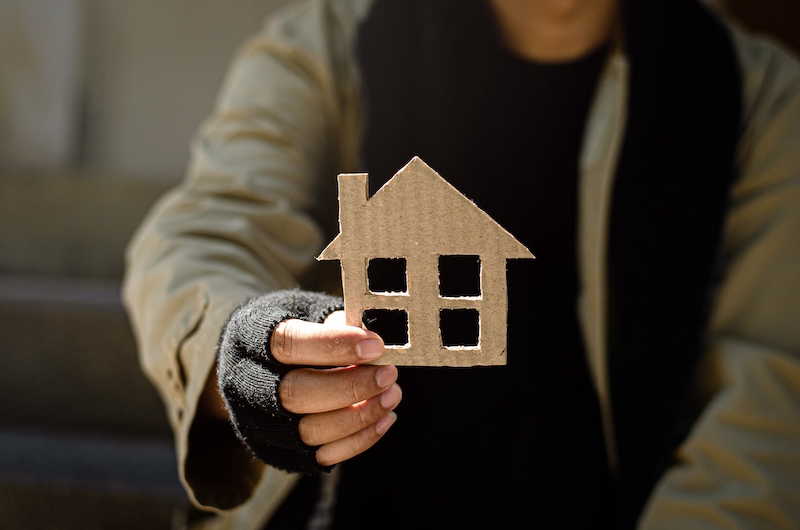What Would it Take to End Homelessness in Chicago?
The Covid-19 pandemic has been especially difficult for those who are experiencing homelessness in Chicago. Overall, it is estimated that chronic homelessness in the US rose over 15% in 2019, 2020, and 2021 due to the global pandemic. Several states alone increased over 10% in their levels of homelessness. This has caused thousands of people to live on the streets, and many are unable or afraid to live in homeless shelters, causing a serious increase in people living outside. This is dangerous, especially in cities like Chicago where it can be extremely cold at night. While it may seem impossible, there are many ways to help reduce and maybe even end homelessness in Chicago. Creating a plan to end homelessness starts with simple steps, and there are generally two approaches.
Housing First

One plan to end homelessness which many people refer to as “housing first” is a great path that can help end homelessness in Chicago. This plan was actually how Finland solved its homelessness issues. As the name suggests, this plan starts with finding sustainable, permanent housing for those displaced by homelessness. This is guided by the concept that to be able to have a job, address any mental issues, or move towards a higher quality of life, the basics need to be fulfilled first. Placing someone in a sustainable living situation with food available gives them the ability to be able to grow. Giving people a choice in where they live is also a part of “housing first”. This doesn’t mean that they will have a giant, beautiful house for $0 per month, but it will offer a safe place that isn’t a homeless shelter.
Why Not a Shelter?
One of the main issues that “housing first” resolves is the problem of long-term living in homeless shelters. Homeless shelters are limited in space and are often rooms filled with beds, with little to no privacy. Sexual assault and violence can occur both in and out of shelters. Some people find themselves engaging in high-risk behaviors just to find a place to sleep for the night, and become trapped in addictions or abusive situations. Homeless shelters are often a place where a homeless person can get a good meal and a bed, but they fill up so quickly, especially on cold nights. Shelters are also a place where fights and violence can quickly break out. Many homeless people are exhausted and stressed, and emotions run high. Also placing a large group of people together in a contained space during a global pandemic has never been a good idea. If a homeless person contracted Covid-19, it would be difficult for them to find help and medical care. Many shelters even have restrictions, like no pets or personal belongings allowed. Sometimes families or youth are not allowed in shelters. This can make them extremely inaccessible for a large percentage of the homeless.
Treatment First
Another plan that can help end homelessness in Chicago is called “treatment first”. This refers to the causes of homelessness that can be helped through treatment. The argument of “treatment first” vs. “housing first” is that giving someone a place to live that is safe does not solve the problems that made someone homeless in the first place. At times, homelessness can be caused by addiction, abuse, disability, and other reasons. “Treatment first” offers homeless individuals the care they need before placing them in a housing situation. While this can seem simple, it is also easier said than done. Some people resist treatment or struggle to escape abusive situations. State hospitals for disabled or mentally ill individuals no longer exist due to a long history of abuse and unsafe conditions. Creating an environment where people can receive treatment, therapy, help getting a job, caring for children, or other needs is imperative to end homelessness in Chicago.
Youth and Families
Homeless youth and families often have a hard time finding aid during homelessness.
Family Aid

When a family becomes homeless, often their children are already in or are placed in foster care. This is very hard on parents, especially single parents, who want to reunite with their children but cannot find work or a place to live that will be enough for them. Programs like housing first can help parents get their children back and start working towards a future and stability. Programs like treatment first can help families get back on their feet and find jobs to be able to get stability and housing. Unity Parenting and Counseling has several programs to help families to find housing and stability and end family homelessness in Chicago.
Youth Aid
Often the largest group of homeless individuals who are overlooked are the youth, specifically ages 18-24, and teenagers. One study showed that in a group of over 30 thousand homeless youth, over 90% of them were between age 18 and 24, and the other 10% were under 18. Often these are individuals who have been kicked out of their homes for various reasons or moved out but were unable to find somewhere to stay. Some of them have limited contact with family and are able to stay in some places, but remain overall homeless. Several of them have recently left the foster care system and cannot take care of themselves. A large portion of this group of homeless youth are LGBTQ+ and have been kicked out of their homes or have been abused or assaulted. These youth deserve safety and help and care. LGBTQ+ youth are 120% more likely to become homeless than others.
End Homelessness by Prevention
One of the ways to help reduce and even end homelessness in Chicago would be by identifying and preventing some of the causes of homelessness. Often a homeless person experiences more than one of these causes, and it can be complicated. Some of the main causes of homelessness are substance abuse, lack of affordable housing, unemployment, and mental illness.
Unemployment
Right now, hiring shortages are happening all over America. Many minimum wage jobs have become available, and the hiring field is more competitive than it has been in years. This is a great time for people to find jobs and be able to start moving towards financial independence and stability. One thing employers in Chicago might do to help those who suffer from homelessness is offering a sign on bonus or benefits to their workers who may need help escaping from homelessness. Unemployment causes homelessness, and employment can help solve it.
Lack of Affordable Housing
Rental prices have skyrocketed since the beginning of the Covid-19 Pandemic. For some time, people were supposed to not be able to be evicted, but the moratorium on evictions expired on October 3. The rental market is extremely competitive with rental listings going up and being removed within a few days. Not only that, some leases have increased hundreds of dollars in just the last two years. This is causing many more people to become homeless who cannot afford to buy a home but are being locked out due to rental prices. Subsidized housing may not be enough, and those applications are also difficult to obtain and have an extremely low poverty line. The people right in between the middle class and the poverty line are suffering greatly during this rental housing crisis and this causes homelessness to increase.
Mental Illness
Due to a lack of affordable healthcare and mental treatment, some homeless people are mentally ill and are without medicine, therapy, or care. These people suffer greatly and need more available treatment facilities and options for medications and other health benefits. Many people who become homeless also have high amounts of PTSD, Anxiety, and other disorders due to their situation. Mental illness impairs a person’s ability to move forward in life. It prevents many people from getting help. Often, people with mental illnesses may be released from a care facility or from prison or a hospital with nowhere to go, and so become homeless. Care for the mentally ill can drastically help to end homelessness.
End Homelessness in Chicago
Join our cause and mission. Help us to make a difference and carry out the plan to end homelessness. There are so many ways we can help make this goal a reality.